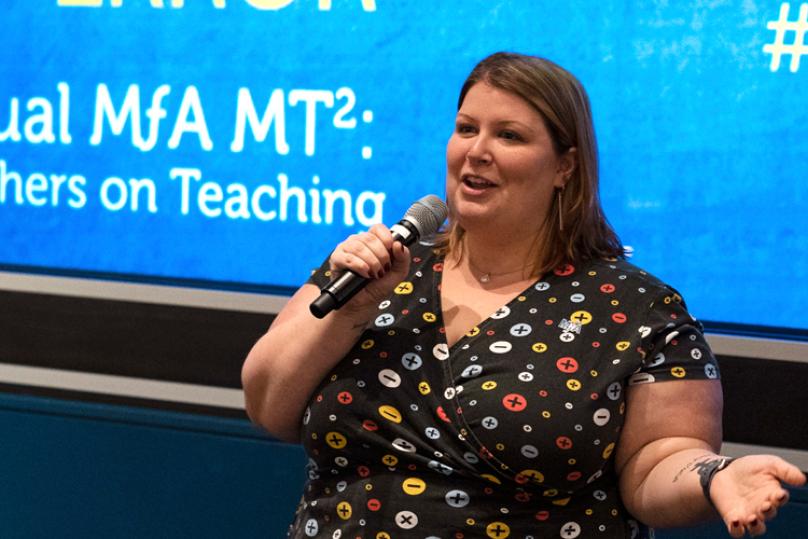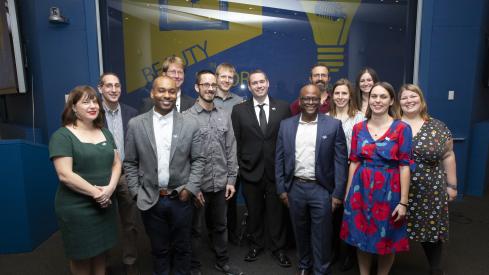
By MƒA Master Teacher Nancy Buck
“To err is human” - Alexander Pope.

I embrace this line from Pope’s poem An Essay on Criticism, Part II. I felt honored and privileged to emcee the 7th Annual MƒA MT²: Master Teachers on Teaching event on December 13th because the theme was near and dear to my heart: “Beauty in Error.” It is a message that I try to send to my students daily, and it was both interesting and informative to hear how my peers interpreted this year’s theme. The event featured eight MƒA Master Teachers who give TEDx-style talks to a packed auditorium of their peers in the MƒA community and others in education. Some of the speakers shared my idea of “Beauty in Error” while others opened my mind to new meanings of this phrase.
I find irony in the fact that I am so passionate about embracing and learning from mistakes when my closest family and friends refer to me as a “Type A,” which is a kind way of saying that I am a “control freak.” Yes, I like my days to be well ordered with a definitive purpose, so the brilliant composition by MƒA Master Teachers Sam Williams, Jay Lang, and Sarah McCoy that we heard during MT² reminded me that there are a million things in any given school day that I have no control over as a teacher. To me, those daily annoyances and interruptions can be beyond frustrating, but the trio’s original musical piece reminded me to take a breath and decide which note to play next.
Teaching math in a country that is math phobic is a challenge to say the least. I have been lucky enough to teach my current seniors since they were in 7th grade. Even so, it has only been in the past two years that some of them are routinely comfortable with making a comment in class that does not start with “I might be wrong but….” In contrast to this group, I have one class of students that I have never taught before, and it has been a struggle to get them to feel safe enough to make comments in class. MƒA Master Teacher Jude Julien made me think about some important next steps that I could take to try to help these students overcome their math phobia. In his MT² talk, “My Bad, Mr. Julien,” he reminded the audience that for students to embrace their mistakes and move forward to try again, they need to feel that they are part of a community. Thank you, Jude, for this important reminder.
While I have studied math long enough to realize that the mistakes I make when learning a new topic are necessary, I have trouble remembering that idea when it comes to my teaching and pedagogy. MƒA Master Teacher Lauren Friedman gave an excellent talk on how important it is to model for our students that mistakes are okay. Teachers make mistakes in their lessons and it does not ruin anyone’s life.
I would say as a math teacher, one of the biggest mistakes I have made is brushing through statistics at the end of the year. It is never a choice that makes me feel proud. However, it is MƒA Master Teacher Kayleigh Rose who has me rethinking my approach. Kayleigh discussed how she struggled to teach margin of error during the 2016 election, and while listening to her MT² talk, I realized that I never even thought about margin of error during this historic election. In retrospect, the message was loud and clear: “Spend more time on statistics with your students.” It was a message that resonated with all the math teachers in attendance.
In trying to convince my students that mistakes are okay, I often tell them that I didn’t initially get awarded a MƒA fellowship, and I felt devastated. Two years later, I applied again and was accepted! However, I am very thankful for those two years. It allowed me to earn my MA in Math. Plus, my first MƒA cohort gave me my best friends and my husband. So while missteps can seem wrong at the time, they can also turn out to be the best path for you. MƒA Master Teacher Gary Rubenstein brilliantly shared his journey about landing in a teaching career. His talk was accurately entitled “Mistakes were Made,” and he humorously highlighted how awkward moments – that feel like a cosmic joke – can lead us to exactly where we belong while making us all the better for the journey.
The start of the second act was a very much appreciated talk by MƒA Master Teacher Zach Korzyk. In education, I feel like I am constantly trying to explain to teachers and administrators that correlation does not imply causation. Zach highlighted the crazy conclusions people make when they don’t fully understand statistics. For example, Zach gave an example showing that your phone number can predict your height. At this point, I looked up and said, “I get it, no more rushing through the statistics unit . . . just too many outrageous errors can be made!”
As a teacher, I struggle with what exactly my main job is. Making sure students understand precalculus? Or dealing with the emotional fallout of the latest trauma? MƒA Master Teacher Michael Holmes’ MT² talk discussed where teachers should draw the line. His own personal experiences made him reevaluate where his line should be in his class. He found that if he moved his line a little and let it get more personal, he’d experience some discomfort, but he also found that he liked the results. Michael gave a nice reminder that classroom magic can happen when you push yourself out of your comfort zone.
A typical conversation between me and my students: A student asks a question. I ask them what they think. They talk for a few minutes and then say “Oh, never mind.” This interaction usually ends with them thanking me, and I respond that I didn’t do anything. MƒA Master Teacher Brian Mueller experiences this same phenomenon in his computer science class and shared his solution in his MT² talk. It just so happens that computer scientists have found a solution: they talk to rubber ducks so that they can have these “no point” conversations when there is no one available. It is an ingenious idea most teacher attendees will now bring to their classes and one I wouldn’t have thought of on my own.
“To err is human”. We have circled back to the beginning. The MT² talk that opened my eyes the most to what “Beauty in Error” means was from MƒA Master Teacher Susie Harter. Susie shared her experience of teaching in a school that was displaced by Hurricane Sandy. She talked about the struggle and hardship that this disaster caused her peers and students. She also talked about how she and her colleagues made school happen when they had absolutely nothing. It was a beautiful and inspiring story. I can get very frustrated in this job because the reality is that we work in a broken system. My community at MƒA makes it better. Every time I come to MƒA courses and workshops and events, I collaborate and connect with teachers who persevere and work incredibly hard to create learning environments where students can learn despite all of the brokenness. The MT² Thursday Thinks event was one example of witnessing how dedicated teachers in a crazy educational system are the definition of “Beauty in Error.”
